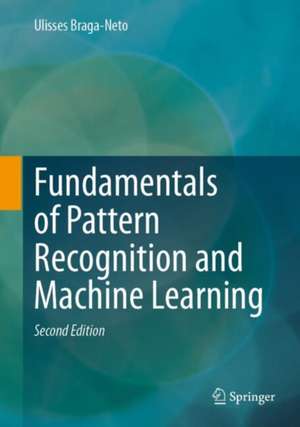Fundamentals of Pattern Recognition and Machine Learning
Autor Ulisses Braga-Netoen Limba Engleză Hardback – 14 sep 2024
Combining theory and practice, this book is suitable for the graduate or advanced undergraduate level classroom and self-study. It fills the need of a mathematically-rigorous text that is relevant to the practitioner as well, with datasets from applications in bioinformatics and materials informatics used throughout to illustrate the theory. These datasets are available from the book website to be used in end-of-chapter coding assignments based on python and Keras/Tensorflow. All plots in the text were generated using python scripts and jupyter notebooks, which can be downloaded from the book website.
| Toate formatele și edițiile | Preț | Express |
|---|---|---|
| Paperback (1) | 325.16 lei 17-23 zile | +28.75 lei 6-12 zile |
| Springer International Publishing – 11 sep 2021 | 325.16 lei 17-23 zile | +28.75 lei 6-12 zile |
| Hardback (1) | 351.21 lei 22-36 zile | +40.04 lei 6-12 zile |
| Springer International Publishing – 14 sep 2024 | 351.21 lei 22-36 zile | +40.04 lei 6-12 zile |
Preț: 351.21 lei
Preț vechi: 439.02 lei
-20% Nou
Puncte Express: 527
Preț estimativ în valută:
67.23€ • 73.05$ • 56.51£
67.23€ • 73.05$ • 56.51£
Carte disponibilă
Livrare economică 31 martie-14 aprilie
Livrare express 15-21 martie pentru 50.03 lei
Preluare comenzi: 021 569.72.76
Specificații
ISBN-13: 9783031609497
ISBN-10: 3031609492
Pagini: 400
Ilustrații: X, 392 p. 87 illus., 78 illus. in color.
Dimensiuni: 178 x 254 x 31 mm
Greutate: 0.96 kg
Ediția:Second Edition 2024
Editura: Springer International Publishing
Colecția Springer
Locul publicării:Cham, Switzerland
ISBN-10: 3031609492
Pagini: 400
Ilustrații: X, 392 p. 87 illus., 78 illus. in color.
Dimensiuni: 178 x 254 x 31 mm
Greutate: 0.96 kg
Ediția:Second Edition 2024
Editura: Springer International Publishing
Colecția Springer
Locul publicării:Cham, Switzerland
Cuprins
Introduction.- Optimal Classification.- Sample-Based Classification.- Parametric Classification.- Nonparametric Classification.- Function-Approximation Classification.- Error Estimation for Classification.- Model Selection for Classification.- Dimensionality Reduction.- Clustering.- Regression.- Bayesian Machine Learning.- Scientific.- Machine Learning.- Appendices.
Notă biografică
Ulisses Braga-Neto, Ph.D. is a Professor in the Department of Electrical and Computer Engineering at Texas A&M University. His main research areas are pattern recognition, machine learning, statistical signal processing, and applications in bioinformatics and materials informatics. He has worked extensively in the field of error estimation for pattern recognition and machine learning, having received an NSF CAREER award for research in this area, and co-authored a monograph with Edward R. Dougherty on the topic. He has also made contributions to the field of Mathematical morphology in signal and image processing.
Textul de pe ultima copertă
This book is a concise but thorough introduction to the tools commonly used in pattern recognition and machine learning, including classification, dimensionality reduction, regression, and clustering, as well as recent popular topics such as deep neural networks and Gaussian process regression. The Second Edition is thoroughly revised, featuring a new chapter on the emerging topic of physics-informed machine learning and additional material on deep neural networks.
Combining theory and practice, this book is suitable for the graduate or advanced undergraduate level classroom and self-study. It fills the need of a mathematically-rigorous text that is relevant to the practitioner as well, with datasets from applications in bioinformatics and materials informatics used throughout to illustrate the theory. These datasets are available from the book website to be used in end-of-chapter coding assignments based on python and Keras/Tensorflow. All plots in the text were generated using python scripts and jupyter notebooks, which can be downloaded from the book website.
Combining theory and practice, this book is suitable for the graduate or advanced undergraduate level classroom and self-study. It fills the need of a mathematically-rigorous text that is relevant to the practitioner as well, with datasets from applications in bioinformatics and materials informatics used throughout to illustrate the theory. These datasets are available from the book website to be used in end-of-chapter coding assignments based on python and Keras/Tensorflow. All plots in the text were generated using python scripts and jupyter notebooks, which can be downloaded from the book website.
Caracteristici
Strikes a balance between theory and practice, with extensive use of Python scripts and real bioinformatics data sets Second Edition includes a new chapter on physics-informed machine learning, as well as additional exercises and figures Includes supplementary material online, as well as instructor resources
